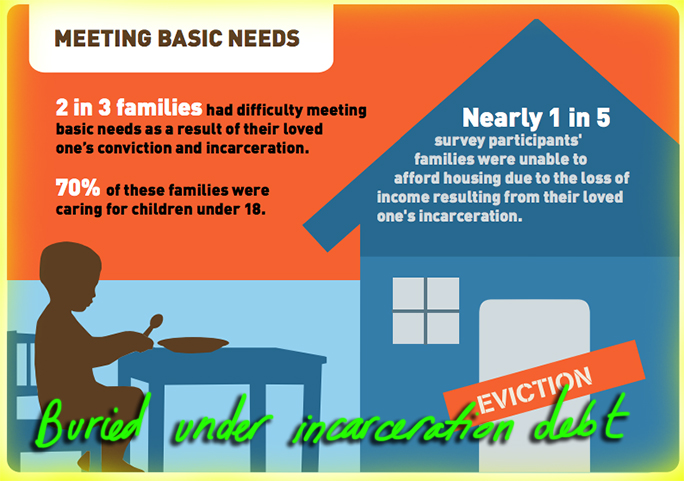REPORT GOES BEYOND THE $80 BILLION THE US SPENDS ON PRISONS TO REVEAL THE COLOSSAL FINANCIAL BURDEN OF INCARCERATION ON FAMILIES
The average family with a locked-up loved one racks up $13,607 in debt related to their family member’s incarceration according to a new report by the Ella Baker Center for Human Rights.
To put that $13,607 deficit in perspective: 38% of survey participants’ yearly household incomes were less than $15,000.
Researchers for the report, which was also sponsored by Forward Together, Research Action Design, and other community partners, gathered information from a sampling of more than 2,000 people in 14 states. They also collected more than 1,000 surveys and held 34 focus group discussions to document families’ individual stories. Of the survey participants, 35% were in California.
One in three families reported falling into debt because of the high costs of accepting collect calls from and visiting their incarcerated loved one. Research shows that contact with family is extremely important for a former offender’s successful reentry into their community, yet many families simply cannot afford to visit loved ones locked up far from home, or pay the fees charged by prison phone service providers.
The high cost of incarceration on families affects women, in particular. Of those family members specifically responsible for the cost of court fees and fines, a whopping 83% were women. A fifth of respondents reported having to take out a loan to cover these costs. It doesn’t help that when a family member is locked up, it often comes with a loss of income into the household.
Two out of three families surveyed had difficulties meeting basic needs because of these fees, fines, and other incarceration-related expenses. And 70% of those families were caring for kids.
“This study confirms what society has ignored for too long,” says Alicia Walters, Movement Building Director at Forward Together, a leading organization in the project. “…that already vulnerable families and the women who sustain them are being plummeted into greater poverty, stress, and strain when their loved ones are incarcerated. Decades of bad policy have torn families apart, typically leaving mothers to make up the difference and bear the brunt of these costs.”
The crippling costs that their families are shouldering weighs on the inmates, too. “Everything that was put into bailing me out was everything my mother had in savings and she borrowed some money from my grandparents,” an ex-inmate from Oakland, CA said. She was back to working paycheck to paycheck. Eventually, about a year and a half after being locked up, my mother had to give up the house she loved and move back to an apartment.”
An incredible 44,000 state and local restrictions are placed on former offenders. The report recommends breaking down barriers to successful reentry—things like housing, government assistance, family reunification, employment, and education—will reduce recidivism and cut costs for families and the government.
Researchers also recommend moving away from a focus on punishment and toward rehabilitation, citing California’s Prop 47 as an example worthy of replication. The report also calls for alternatives to pre-trial detention.
“Shrinking the criminal justice system through sentencing reforms is not enough,” said Azadeh Zohrabi, National Campaigner at the Ella Baker Center for Human Rights. “We must enact policies that restructure the system, remove barriers, and restore opportunities to create lasting change that reinvests in the families and communities most harmed by mass incarceration.”



Not mentioned in this article. What has been the benifit of the current historical reduction of crime? What will be the cost of of an increased crime rate , not only in money , but in blood? Excuse me if I don’t weep for people who choose to bankrupt themselves in order to make their inprisoned relatives that much more comfortable. As for the children? I’m sure like the rest of us they are better off with the criminal behind bars.
Who, pays? The Victims of these savages. Keep them locked up. I’ll gladly continue paying taxes to achieve this.
Financial & psychological debt and losses should be first & foremost addressed to the plight of victims of crime.
Don’t commit the crime……many times it is much easier to be locked up then trying to survive on the outside. Comes down to a matter of choice.